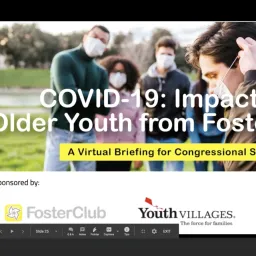Watch a recording of the Virtual Congressional Briefing
Members of Congress and Congressional Staff were invited to attend a short virtual briefing held on May 13, 2020 and hosted by Youth Villages, Juvenile Law Center, and FosterClub on how COVID-19 is affecting older youth from foster care.
>>> WATCH THE RECORDED BRIEFING
.
Panelists:
- Tony Parsons, Youth Villages Federal Policy Associate, moderator
- Christian Carter, Pennsylvania - former foster youth
- Rimy Morris, Indiana - extended foster care youth
- Phoenix Ramirez, Oregon - former foster youth
- Tee Mosley, Iowa - former foster youth
- Celeste Bodner, FosterClub Executive Director
- Jennifer Pokempner, Juvenile Law Center
- Kerry McKittrick, Senior Policy Advisor to Congressman Jim Langevin (D-RI)
Young people in transition from foster care to adulthood have been left incredibly vulnerable during the COVID-19 crisis. Often without family to rely on, young people who age out of foster care are left to navigate challenges they could not have imagined — let alone planned for — during this pandemic.
FosterClub, the national network of young people from foster care, will provide a first look at its newest poll (n=613), to be publicly released this week, reflecting the experiences of transition age youth from foster care (age 18-24) during the COVID-19 crisis. The new poll provides a glimpse at how the pandemic is placing young people in danger of homelessness, food insecurity, and mental health crisis - and also captures foster youths’ experiences accessing safety-net support such as the stimulus check and unemployment benefits.
Key Findings from FosterClub’s Poll:
- Employment: Nearly 65 percent of transition-age youth from foster care who were working before the pandemic have lost employment; half of those who applied for unemployment benefits did not receive assistance.
- Stimulus Checks: More than half reported they did not receive the stimulus check (52%).
- Food Insecurity: Nearly 1 in 5 young people, or 19% of those questioned, reported they have run out of food.
- Housing Stability: 23% of young people reported that they are being forced to move or fear being forced to leave their current living situation. Several noted that they were able to return to a previous foster home, although they recognized it as a temporary solution. Many indicated housing was tied to their schooling, and worried where they will go if school does not reopen in the fall.
- Guidance from Adults: Just 37% of the transition-aged youth from foster care have family members (legal or chosen) to rely on during the crisis. One in 5 youth reported that they are entirely on their own.
Youth Villages, Juvenile Law Center and FosterClub are proud to join over 650 youth, parents and advocates and over 110 organizations (national and state) in a sign-on letter asking Congress to #UPChafee to help older youth from foster care weather this crisis. In brief, the requests to Congress include:
1. Increase Chafee Funding by 500 Million.
2. Extend the Age of Eligibility for Chafee Aftercare Services to Age 23 for All Youth.
3. Suspend Participation Requirements for Young People in Extended Foster Care.
4. Place a Moratorium on Discharges from the Foster Care System for Youth Ages 18-21.
5. Allow States to Draw Down Title IV-E funds until a Young Person Reaches Age 22.
> READ THE FULL SIGN-ON LETTER: www.tinyurl.com/UpChafeeLetter
.
.


